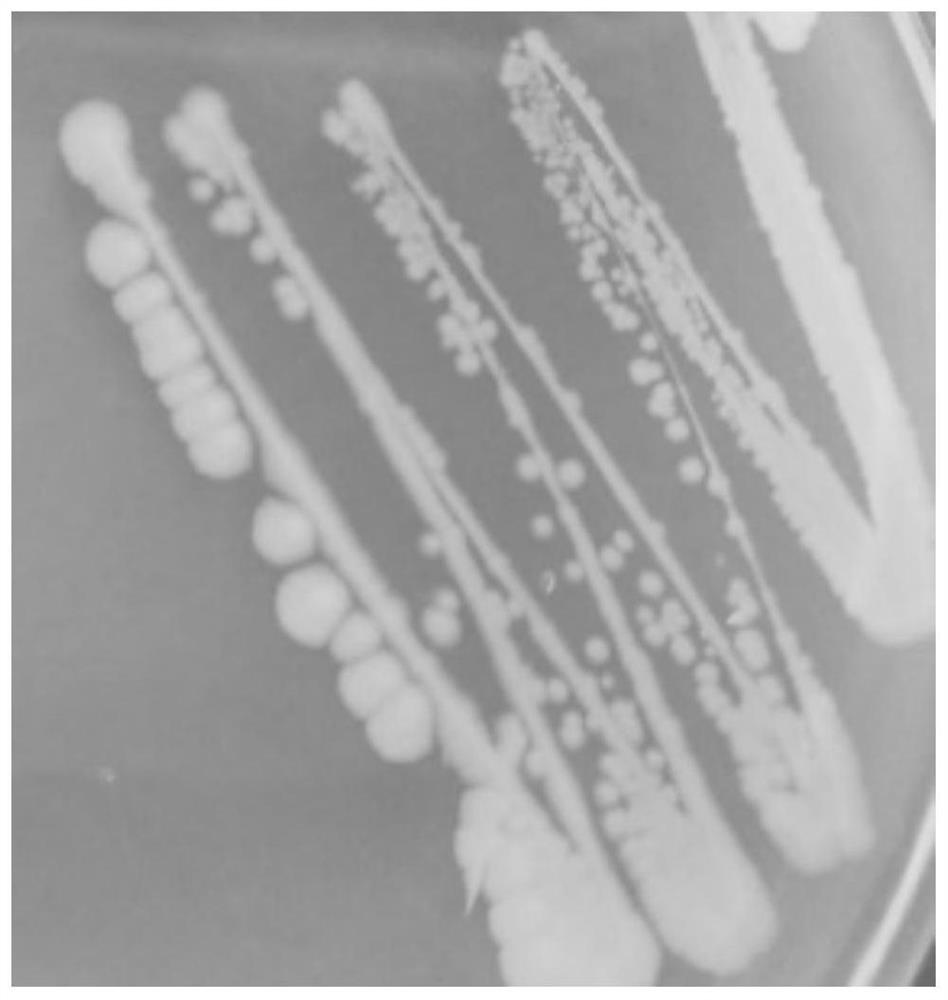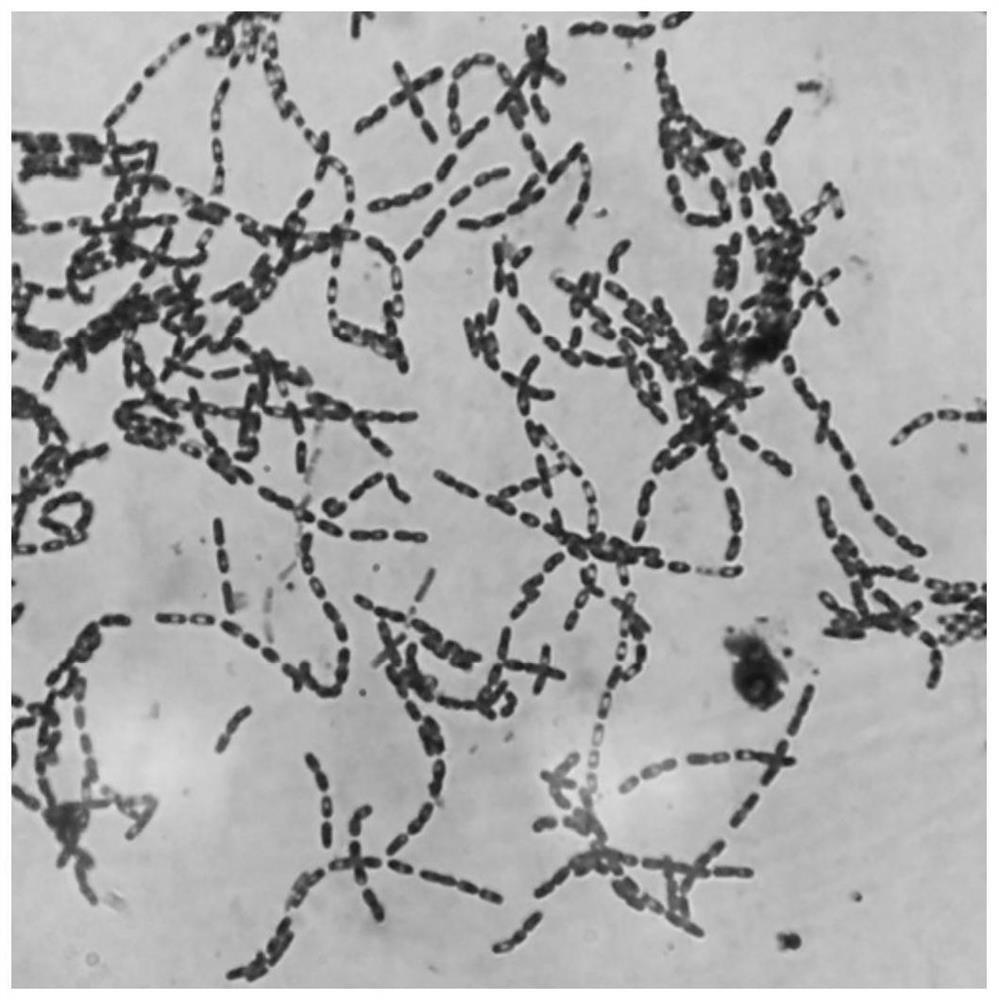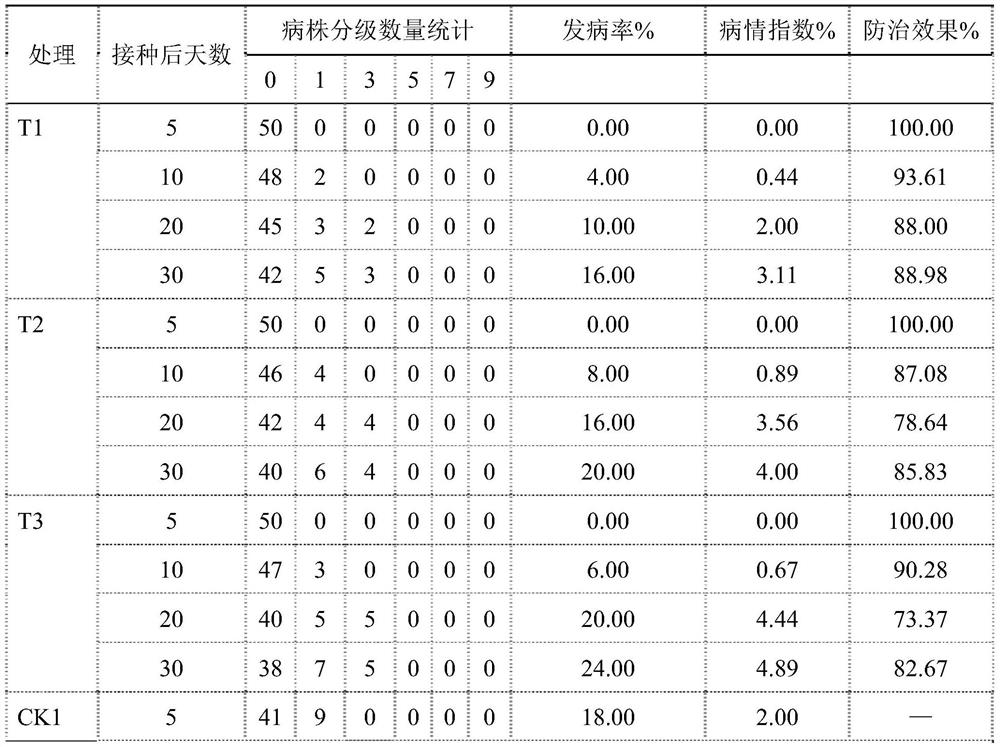A Salt-alkali-tolerant Pacific Bacillus and Its Live Bacterial Preparation and Application
A technology of bacillus and live bacteria preparation, applied in the field of agricultural biology, can solve problems such as limited control effect, and achieve the effects of reducing disease occurrence, improving biological stability, and strong inhibitory effect
- Summary
- Abstract
- Description
- Claims
- Application Information
AI Technical Summary
Problems solved by technology
Method used
Image
Examples
Embodiment 1
[0019]Example 1: Screening of Pacific Bacillus YJJK-16
[0020](1) Screening of salt-tolerant strains
[0021]Pacific Bacillus YJJK-16 was isolated from the rhizosphere soil of cabbage. The soil was sampled in Dongying City, Shandong Province, as saline soil. The specific separation method is as follows: Weigh 10 g of soil sample, put it into a pre-sterilized 250 mL conical flask containing 90 mL of deionized water and 10-20 glass beads, and shake at 180 r / min for 20 minutes. Using gradient dilution method, dilute the soil solution to 10-2, 10-3, 10-4, 10-5, 10-6, 10-7. Pipette 0.1 mL of soil solution of different dilutions, put it into a high-salt-alkali selective medium plate, spread evenly, and then incubate at 37°C for 24-48h. According to the difference of colony and cell morphology, different strains were transferred to the slant of the preservation medium test tube, cultured at 37°C for 1-2 days, covered with moss, and stored in a refrigerator at 4°C for later use. A total of 82 sa...
Embodiment 2
[0027]Example 2: Identification of Pacific Bacillus YJJK-16
[0028](1) Morphological and physiological and biochemical characteristics
[0029]The colony and bacterial characteristics of the Pacific Bacillus sp. YJJK-16 strain: cultured on LB medium at 37°C for 2 days, the colony was milky white, 1.5-2.5mm in diameter, translucent, bulging, smooth and moist, with regular edges. The texture is relatively uniform; the bacteria are rod-shaped with spores. The LB medium is Luria-Bertani medium, and its formula is: 5 g of yeast powder, 10 g of tryptone, 10 g of sodium chloride, 20 g of agar, 1000 mL of water, and pH 7.0.
[0030]The physiological and biochemical characteristics of the Pacific Bacillus sp. YJJK-16 strain: Gram stain test positive, contact enzyme test positive, starch hydrolysis test positive, exercise test positive, nitrate reduction test positive, gelatin liquefaction test positive, D-glucose The acid production test is positive, the anaerobic growth test is negative, the acetyl...
Embodiment 3
[0034]Example 3: Preparation of Bacillus Pacificus YJJK-16 inoculum
[0035]The preparation method of the Pacific Bacillus YJJK-16 strain inocula includes the following steps:
[0036]1) Strain activation: Transfer the cryopreserved Bacillus pacificum YJJK-16 strain to the slope of the LB medium test tube, and culture it at 37°C for 24 hours for activation. The LB medium is Luria-Bertani medium, and its formula is: 5 g of yeast powder, 10 g of tryptone, 10 g of sodium chloride, 20 g of agar, 1000 mL of water, and pH 7.0.
[0037]2) Preparation of Erlenmeyer flask seeds: scrape the activated Bacillus Pacificus YJJK-16 lawn with an inoculating loop, inoculate it in LB medium, and cultivate it at 37°C for 24 hours. The LB medium is Luria-Bertani medium, and its formula is: 5 g of yeast powder, 10 g of tryptone, 10 g of sodium chloride, 20 g of agar, 1000 mL of water, and pH 7.0.
[0038]3) Preparation of seed tank strains: transfer the Erlenmeyer flask seeds to a 10L seed tank containing 6L LB med...
PUM
| Property | Measurement | Unit |
|---|---|---|
| diameter | aaaaa | aaaaa |
Abstract
Description
Claims
Application Information
 Login to View More
Login to View More - R&D
- Intellectual Property
- Life Sciences
- Materials
- Tech Scout
- Unparalleled Data Quality
- Higher Quality Content
- 60% Fewer Hallucinations
Browse by: Latest US Patents, China's latest patents, Technical Efficacy Thesaurus, Application Domain, Technology Topic, Popular Technical Reports.
© 2025 PatSnap. All rights reserved.Legal|Privacy policy|Modern Slavery Act Transparency Statement|Sitemap|About US| Contact US: help@patsnap.com



